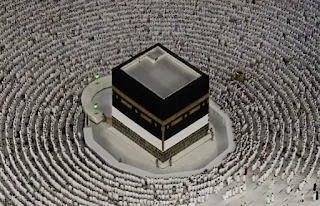The Pilgrimage & the Eid Festival
Hajj, the fifth pillar of Islam, comes in the last month of the lunar calendar, Dhul-Hijjah (which literally means, Month of Hajj). The Hajj is an exceptional occasion where Muslim unity appears in its finest form. The Ummah of the Prophet Muhammad (pbuh) sees itself united in the same spirit of sacrifice and in the same garment: two simple unsewn white cloths. Therefore, we bear witness to the unified state of Muslims, the same state that must be manifest in every Muslim throughout the world.
So, with the Hajj, all differences disappear, all barriers are broken, and Muslims follow the same course, the same routine for the performance of the rites prescribed by Allah. This scene of unity is a balm of warmth to the heart, comforting for the unified Islamic soul.
Dressed in their white
attire, which indicates purity of heart and soul, beautiful are the moments
when all the pilgrims move from Mina to Arafah and stand just like Prophet
Ibrahim (as) and the Holy Prophet Muhammad (pbuh) did, thus testifying to unity
and ardent desire to please Allah.
Hazrat ‘Umar bin
Al-Khattab reported: One day a Jew said to me: “O Leader of the believers!
There is a verse in your holy book which is read by all of you (Muslims) and if
it had been revealed to us (we, Jews), we would have taken the day on which it
was revealed as a day of celebration.” ‘Umar bin Al-Khattab asked: “What
is this verse?” The Jew replied: “This day I have perfected your
religion for you, completed My favour upon you, and
have chosen for you Islam as your religion.” (5:3
[or 4]) ‘Umar replied: “Without doubt, we know when and where this verse was
revealed to the Prophet. It was Friday and the Prophet (pbuh) was standing in Arafat
(i.e., the day of Hajj).” (Bukhari)
Therefore, Hajj is
performed at a specific time and place and it is prohibited to perform it at
any other time or in any other place. The Holy Quran says: “The pilgrimage is done during well-known months. Let him
who undertakes to do so (know this): no sexual relations, no debauchery, no
quarrel during the Hajj. Whatever good you do, Allah certainly knows. And take
your provisions; but truly the best provision is piety. And fear Me, O you who
are endowed with reason!” (Al-Baqarah 2:198)
So when Eid-ul-Adha
comes, it mainly marks a ritual sacrifice. The immolation of an animal – ox,
cow, sheep, goat, camel – which represents a momentous episode in the life of
two illustrious prophets of Allah, Ibrahim (as) and Isma’il (as), as well as
the mother of the latter, Hajra (ra).
After seeing in a dream
that he was sacrificing his only son Isma’il, Ibrahim (as) waited until he
reached an age of understanding to communicate to him the divine order therein,
i.e. , the sacrifice of Isma’il. When the time came to ask his opinion, the boy
with a big heart and faithful to the worship of Allah did not hesitate to
submit to the divine will.
So, Ibrahim (as) placed
him on his forehead on the altar; everything was ready. Hazrat Ibrahim (as) had
a sharp knife in his hand so that his son would not suffer too much. But before
he had time to slit his throat, the angel Gabriel (Jibreel) intervened to stop
him in his tracks. He announced to him that his sacrifice had already been
accepted and commanded him by order of Allah to replace Isma’il (as) with a
ram. And it is this rite which is adopted by the entire Muslim Community
throughout the world on the orders of Allah as well as His Holy Prophet
Muhammad (pbuh).
Therefore, Muslims who
have the means should make it their duty to perform Qurbani/ Udhiya. It
is such an act which is also necessary for those who are in the holy land to
perform the Hajj. The Qurbani, in fact, is one of the rites encompassing
the entire Hajj.
Qurbani can be
performed for three days during the 10th, 11th and 12th
days of Dhul-Hijjah. This Qurbani symbolizes the EID-UL-ADHA
festival which brings the fear of Allah to its peak, as well as joy,
fraternity, solidarity, and morality on the part of the one who performs it by
pleasing his Creator, Allah the Almighty.
This act of sacrificing
an animal should not be perceived as flesh and blood are necessary to Allah. On
the contrary, it is piety of the heart that reaches Allah. As Allah says in the
Holy Quran: “Neither their flesh nor their blood
will reach Allah. But what reaches Him on your part is piety.” (Al-Hajj
2:38)
To achieve this purity
of soul, the pilgrim must connect to Allah through his intention, his prayer
and his sincerity. A pilgrimage that is done only for the eyes of people (for
ostentation – Riya) is not a valid pilgrimage (whether for Umrah
or Hajj). Allah looks at the sincerity of the heart and the intention
therein.
----Eid-ul-Adha Sermon delivered by Imam- Jamaat Ul Sahih Al Islam International Hazrat Muhyiuddin Al Khalifatullah Al Mahdi Munir Ahmad Azim (aba) of Mauritius on 17 June 2024~10 Dhul-Hijjah 1445 AH.





